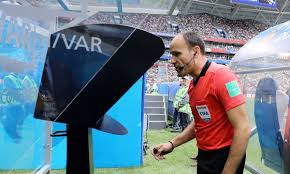VAR Drama, Football vs Technology, VAR helping or Hurting the Game? By Oluwasetemi Adeyinka
It is historic that in August 2016, the Video Assistant Referee (VAR) system was approved and introduced by IFAB, the journey began with the live experiments with the new technological device .
The VAR came with an load of anticipated promises thought to be the channel that would usher in the lust to make the game fairer.
Hoping that the VAR would aid in the implementation of the most controversial law of the game, which is the offside calls, help correct red cards decisions , and furter help review penalties.
VAR was meant to invoke the spirit of fairer verdicts on the football pitch.
it was first put to useage for the first time in March 2016 in a professional match in the United Soccer League (USL) game in the United States,
it was then proceed to be introduced to several other leagues and major football tournaments, its arrival to the scene was heralded and was applauded for assumedly making football games fairer.
As time goes on, the global football community has began to express cracked expressions over what it once described as one of the wonders of the football world and heritage..
While some see VAR as an necessary evolution, others view it as a tool that’s draining the soul out from the beautiful game.
So the lingering question begging for answer simply : is technology aiding or barring the fun in football?
There’s no denying the value of accuracy in a sport, where careers, titles, and dreams can turn on a single decision.
Before VAR, football fans carried grudges for decades like Maradona’s infamous “Hand of God” goal at the Mexico 86 FIFA World Cup, also the famous Thierry Henry’s handball that ended Ireland’s 2010 World Cup hopes.
VAR was meant to be the antidote to such top most controversial decisions by the men at the centre .
And in many cases, it has delivered as expected , at the 2018 World Cu, its first major use period , the VAR corrected 17 decisions, including pivotal penalty calls and red cards. It’ had helped referees make more informed decisions and has shined a spotlight on previously ignored fouls in the vital area .
But even with these benefits, discontent is growing.
One of the most common criticisms of VAR is the disruption of flow. Football is a fast paced sport built on momentum. When a goal is scored and celebrations erupt, nothing feels worse than watching players stand frozen, staring at the referee touching his earpiece.
This pause the dreaded wait for confirmation has made matches feel clinical and emotionally detached. Players are hesitant, fans are confused, and referees appear less confident in their instincts.
Ironically, VAR hasn’t eliminated controversy it’s simply moved it from the pitch to the replay screen.
Consider the 2022 World Cup quarterfinal between Argentina and the Netherlands. A series of baffling VAR decisions left both teams furious. Or more recently, in 2024, Arsenal was denied a late penalty in a crucial match despite a clear handball, with VAR failing to intervene. Fans took to social media, pundits debated for days, and trust in the system dipped even further.
The problem? VAR is still run by humans. And with that comes interpretation, inconsistency, and error, which leads to a Bigger Question: What Kind of Game Do We Want?
Beneath the debates and technology lies a more philosophical question: Should football be perfect, or should it be human?
For many, the beauty of the game lies in its unpredictability the rough edges, the imperfections, and the raw emotion. In the quest for fairness, some argue VAR is making football feel more like a courtroom than a sport.
But others believe we must adapt. With so much money and pressure riding on decisions, why not use every tool available to get them right?
Most experts agree that the issue isn’t with technology itself, but how it’s used. To rebuild trust, VAR systems must become more transparent. Some leagues are experimenting with referees announcing decisions live to the crowd (premier league, English Football League, UEFA Euro, FIFA Women’s World Cup similar to American football. Others are calling for time limits on reviews and clearer communication between officials and viewers.
At the end of the day, VAR isn’t going away. But for it to truly help the game, it needs refining. Less delay. More consistency. And most importantly, a respect for the rhythm and emotion that make football beloved around the world.
So, is VAR helping or hurting football?
Maybe it’s doing both.
And maybe the real challenge is not choosing between the two but learning how to live with the tension between pains and celebrations.


